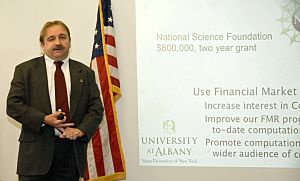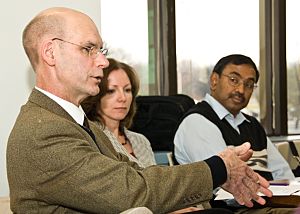UAlbany Develops Pioneering Curricula in Financial Market Regulation
NSF grant of $800,000 supports project aimed at developing students' computational thinking skills for financial market management
Contact(s): Catherine Herman (518) 956-8150
 |
Professor George Berg will lead a multidisciplinary team in developing new curricula to introduce students to the critical role of computational thinking in financial market oversight and regulation. (Photo Mark Schmidt) |
ALBANY, N.Y. (December 1, 2009) -- As worldwide financial markets become more complex and the volume of data balloons, regulators and compliance professionals increasingly rely on computing and information technology to guarantee safeguards in the market. To prepare students for careers in financial market regulation, the University at Albany's Center for Financial Market Regulation (CFMR) will develop pioneering new curricula to introduce students to the critical role of computational thinking in financial market oversight and regulation.
With a grant of $800,000 from the National Science Foundation (NSF) to create materials that will be freely available for educators and others to use, the Center will design case studies, modules, and a series of courses to help students develop computational thinking skills in financial market supervision and beyond. The project is funded by NSF's Computer & Information Sciences & Engineering Directorate, Pathways to Revitalized Undergraduate Computing Education program.
"The paradigm shift that has 'IT-ified' the financial industry needs to be mirrored by a corresponding shift in our educational programs," said UAlbany President George M. Philip. "The far-reaching consequences of the economic meltdown dictate the need for a holistic approach to integrate computational thinking into every aspect of a student�s education."
"Today's markets are driven by computer science -- high speed hardware, sophisticated software, and huge databases," said George Berg, chair of Computer Science and head of the CFMR development team. "This project will help students see the value of computational thinking by showing its importance to financial markets and their regulation. Computational thinking has an enormous impact in many fields -- mathematics, business, public policy, and throughout the social sciences."
 |
David McCaffrey, co-director of the Center for Financial Market Regulation; Theresa A. Pardo, director of the Center for Technology in Government; and Distinguished Teaching Professor S. S. Ravi are among the interdisciplinary faculty associated with the College of Computing and Information. (Photo Mark Schmidt) |
Berg heads a development team that comprises David McCaffrey, co-director of the Center for Financial Market Regulation and Distinguished Teaching Professor in the Rockefeller College of Public Affairs and Policy, InduShobha Chengalur-Smith, chair of the Information Technology Management Department in the School of Business, Robert L. Bangert-Drowns, dean of the School of Education, and Theresa A. Pardo, director of the Center for Technology in Government.
The interdisciplinary team will work with financial firms and government and industry regulators to create problem-based undergraduate curricula that address current and future needs of the field. These teaching materials will first be used in financial market regulation courses, and then extended to courses in computing, business, public policy, economics, mathematics, and the social sciences to show the widespread importance of computational thinking.
"The regulatory landscape has become increasingly complex," said John F. Malitzis, executive vice president in the Market Surveillance division, NYSE Regulation. "As financial markets become more intricate, oversight will increasingly rely on technologies yet to be developed. It is essential to develop educational programs that will anticipate the market's growth and the levels of computational and analytical skills required to work with its strengths and weaknesses."
Gerard Citera, counsel at Davis Polk & Wardwell and member of the Executive Committee for the Center for Financial Market Regulation, said, �The members of the Advisory Council to the Center have been very supportive and have recognized the need for programs of this type. One of the strengths of CFMR, and a unique characteristic that distinguishes it from others, is the way it works cooperatively with this diverse Advisory Council and taps into members' knowledge, experience, and expertise in financial market regulation."
Edward Reinfurt, executive director of the New York State Foundation for Science, Technology, and Innovation (NYSTAR) said, "The financial markets are critically important to the economy of New York State, the nation, and the world. The financial crisis has made clear the need for effective regulation, and the Center for Financial Market Regulation should be applauded for focusing its education and research on this concern. This project builds on the Center's strengths by addressing the technological and educational needs essential to better prepare professionals for careers in financial market assurance."
The Center for Financial Market Regulation is a partnership of the University at Albany, Albany Law School, and professionals in financial markets, law, and regulatory organizations. The Center designed the nation�s first undergraduate major and minor in financial market regulation.
Editors: download a video of Dr. George Berg discussing the project.
![]() For more news, subscribe to UAlbany's RSS headline feeds
For more news, subscribe to UAlbany's RSS headline feeds
Educationally and culturally, the University at Albany-SUNY puts "The World Within Reach" for its 18,000 students. An internationally recognized research university with 58 undergraduate majors and 128 graduate degree programs, UAlbany is a leader among all New York State colleges and universities in such diverse fields as public policy, nanotechnology and criminal justice. With a curriculum enhanced by 300 study-abroad opportunities, UAlbany launches great careers. For more information about this globally ranked University, visit www.albany.edu. For UAlbany's extensive roster of faculty experts, visit www.albany.edu/news/experts.shtml.


